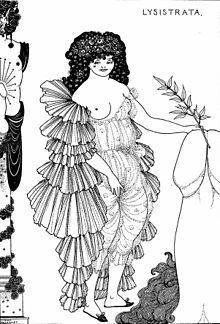This article has multiple issues. Please help improve it or discuss these issues on the talk page. (Learn how and when to remove these messages)
|
| Lysistrata | |
|---|---|
 Illustration by Aubrey Beardsley, 1896 Dramatis Personae in ancient comedy depend on scholars' interpretation of textual evidence. This list is based on Alan Sommerstein's 1973 translation.[1] | |
| Written by | Aristophanes |
| Chorus |
|
| Characters |
|
| Mute |
|
| Setting | Before the Propylaea, or gateway to the Acropolis of Athens, 411 BCE |
Lysistrata (/laɪˈsɪstrətə/ or /ˌlɪsəˈstrɑːtə/; Attic Greek: Λυσιστράτη, Lysistrátē, lit. 'army disbander') is an ancient Greek comedy by Aristophanes, originally performed in classical Athens in 411 BC. It is a comic account of a woman's mission to end the Peloponnesian War between Greek city states by denying all the men of the land any sex, which was said to be the only thing they truly and deeply desired. Lysistrata persuades the women of the warring cities to withhold sexual privileges from their husbands and lovers as a means of forcing the men to negotiate peace—a strategy that inflames the battle between the sexes.[citation needed]
The play is notable for being an early exposé of sexual relations in a male-dominated society. Its structure represents a shift from the conventions of Old Comedy, a trend typical of the author's career.[2] It was produced in the same year as the Thesmophoriazusae, another play with a focus on gender-based issues, just two years after Athens' defeat in the Sicilian Expedition.[citation needed]